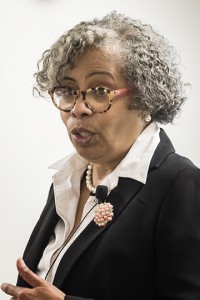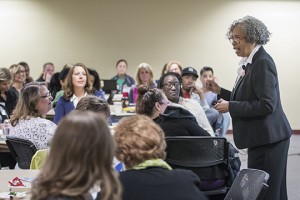
With just a few weeks left in the school year, area teachers have not stopped looking for ways to improve their practice. On May 13 in St. Paul, 150 educators and community members attended a workshop led by Dr. Gloria Ladson-Billings, professor and Kellner Family Chair in Urban Education at the University of Wisconsin-Madison.
Ladson-Billings is renowned for her research and work in critical race theory and culturally relevant pedagogy, a term which she coined in 1995. Her workshop, “Culturally Relevant Pedagogy is Still Relevant,” focused on establishing effective teaching relationships with students from diverse backgrounds.
During one activity, Ladson-Billings read various statements about education and asked participants line up across the room based on how much they agreed or disagreed with the statement. When she asked if culturally relevant teaching could be applied to all kinds of students, agreement was nearly unanimous. However, Ladson-Billings said, not everyone sees it that way.
“Culturally relevant pedagogy is a strategy for teaching all learners,” she said. “And yet, as soon as people hear that, their minds go directly to kids of color.”
Ladson-Billings emphasized that it is incorrect to consider culturally relevant pedagogy as a method or system. It’s not about following a strict recipe, she said, but about understanding how to cook.
“What we’re talking about is less about technique than beliefs,” she remarked.
Ladson-Billings outlined several beliefs she thinks all culturally relevant educators must hold. First, she said, teachers must believe that all students have the capability to learn.
“I do professional development a lot, and I show teachers examples of stuff they can do,” said Ladson-Billings. “Invariably, I hear people who’ll say, ‘My kids can’t do that.’ My question is, ‘How do you know?’”
Culture, context, and connecting
Teachers must also recognize how permeating culture is, Ladson-Billings said. Culture is a vital part of the human experience that cannot be ignored in school.
“We are all cultural beings,” she said, “and culture influences every aspect of our being, including our learning.”

Ladson-Billings also reminded the participants that it is the teacher’s responsibility to learn about students’ cultures and communities. Culture can be used as a lever for learning, she said, and it can help students connect their classroom experience to large-scale social issues, politics, and their lives outside of school.
“Kids have to have the opportunity to participate in learning experiences that connect them with these larger contexts,” she said.
Connection in the classroom depends on honest interactions between teachers and students, according to Ladson-Billings. She warned the audience against presenting themselves to students in a false manner–a practice Ladson-Billings says she sees too frequently.
“Often our kids are in classrooms with what I’d call a cardboard cutout,” she said, meaning a teacher who doesn’t portray him or herself honestly to students. Effective teachers, she said, will allow students to get to know them as a human being.
Answering questions at the end of the workshop, Ladson-Billings said more should be done at the higher education level to create culturally relevant teachers. Stricter admissions processes and more focus on the transition between coursework and student teaching would ensure higher-quality teacher candidates, she added.
“In the end, our kids are suffering because we’re not being more discerning,” she said. “Fundamentally, I think the profession has to make some huge changes.”
More information
Gloria Ladson-Billings is on Twitter as @gjladson, where she participates in a weekly discussion of hip-hop and education every Tuesday at 8 p.m. under the hashtag #HipHopEd.
Ladson-Billings’ visit to the University of Minnesota was presented by the CEHD Office of Professional Development and the Urban Leadership Academy as its final workshop of the 2014-2015 season.
Story by Ellen Fee | Photos by Greg Helgeson



